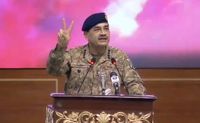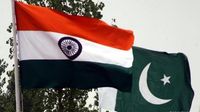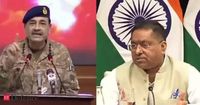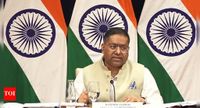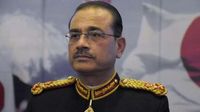On Thursday, April 17, 2025, India firmly responded to remarks made by Pakistan Army Chief General Asim Munir, who referred to Kashmir as Islamabad's "jugular vein." The Ministry of External Affairs (MEA) spokesperson, Randhir Jaiswal, emphasized that Kashmir is a Union Territory of India, asserting that the only relationship Pakistan has with the region is the "vacation of illegally occupied territories by that country."
Jaiswal's remarks came just a day after General Munir addressed the Overseas Pakistani Convention in Islamabad, where he reiterated Pakistan's claim over Kashmir and invoked the two-nation theory, which underpins the ideological foundation of Pakistan's creation. In his speech, Munir stated, "Our stance is absolutely clear, it was our jugular vein, it will be our jugular vein, and we will not forget it. We will not leave our Kashmiri brothers in their heroic struggle."
Munir's comments were aimed at rallying support among the Pakistani diaspora, urging them to remember the sacrifices made for the establishment of Pakistan and to pass on this legacy to future generations. He emphasized, "You have to tell Pakistan’s story to your children so that they don’t forget that our forefathers thought we were different from Hindus in every possible aspect of life," reinforcing the notion that the identities of the two nations are fundamentally distinct.
His statements come amid a backdrop of heightened tensions between India and Pakistan, particularly following India's revocation of Article 370 in August 2019, which stripped Jammu and Kashmir of its special status and bifurcated the former state into two federally-administered territories. This move sparked outrage in Islamabad and has resulted in an ongoing standoff between the two nations.
In response to Munir's remarks, Assam Chief Minister Himanta Biswa Sarma also weighed in, stating, "The delineation is clear; our paths are divergent. It is now incumbent upon us to fortify our nation, uphold our dharma, and cherish our civilizational values." His comments reflect a broader sentiment in India regarding the need to strengthen national identity in the face of external challenges.
Furthermore, Jaiswal addressed Pakistan's ongoing reputation as a hub for terrorism, linking it to the recent extradition of Tahawwur Rana from the United States to India. Rana is being interrogated by India's National Investigation Agency (NIA) for his alleged involvement in the 2008 Mumbai terror attacks, which claimed over 170 lives. Jaiswal stated, "Pakistan may try very hard, but its reputation as the epicenter of global terrorism will not diminish," highlighting the need for Pakistan to bring to justice other individuals linked to the attacks whom it continues to shield.
The extradition of Rana has reignited calls for accountability regarding the Mumbai attacks, and investigators are probing potential connections between him and various extremist groups, including Lashkar-e-Taiba and Harkat-ul-Jihadi Islami, as well as possible ties to Pakistan's Inter-Services Intelligence (ISI).
General Munir's invocation of the two-nation theory and his portrayal of Pakistan as a noble, embattled nation drew concern across the border. His emphasis on cultural pride and political continuity serves as a rallying cry for Pakistanis, particularly at a time when the country faces numerous internal challenges, including political protests and security threats from groups like the Balochistan Liberation Army (BLA).
In his address, Munir vowed to crack down on terrorism in Balochistan, stating, "Even ten generations of terrorists cannot harm Balochistan and Pakistan." His comments reflect a broader narrative being pushed by Pakistan’s military leadership, aimed at consolidating support amid ongoing political instability.
As tensions continue to simmer between the two nuclear-armed neighbors, the rhetoric from both sides indicates that the Kashmir issue remains a deeply entrenched fault line in their relationship. With neither side showing signs of backing down, the war of words is likely to persist.
In summary, the exchange between India and Pakistan over Kashmir highlights the ongoing complexities of their geopolitical landscape. While General Munir seeks to galvanize national pride and unity within Pakistan, India's government remains steadfast in its position regarding Kashmir's status as an integral part of India. The situation underscores the need for dialogue and resolution, though the path forward remains fraught with challenges.
